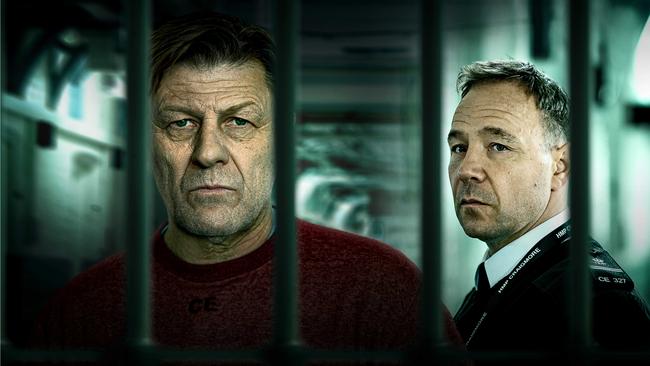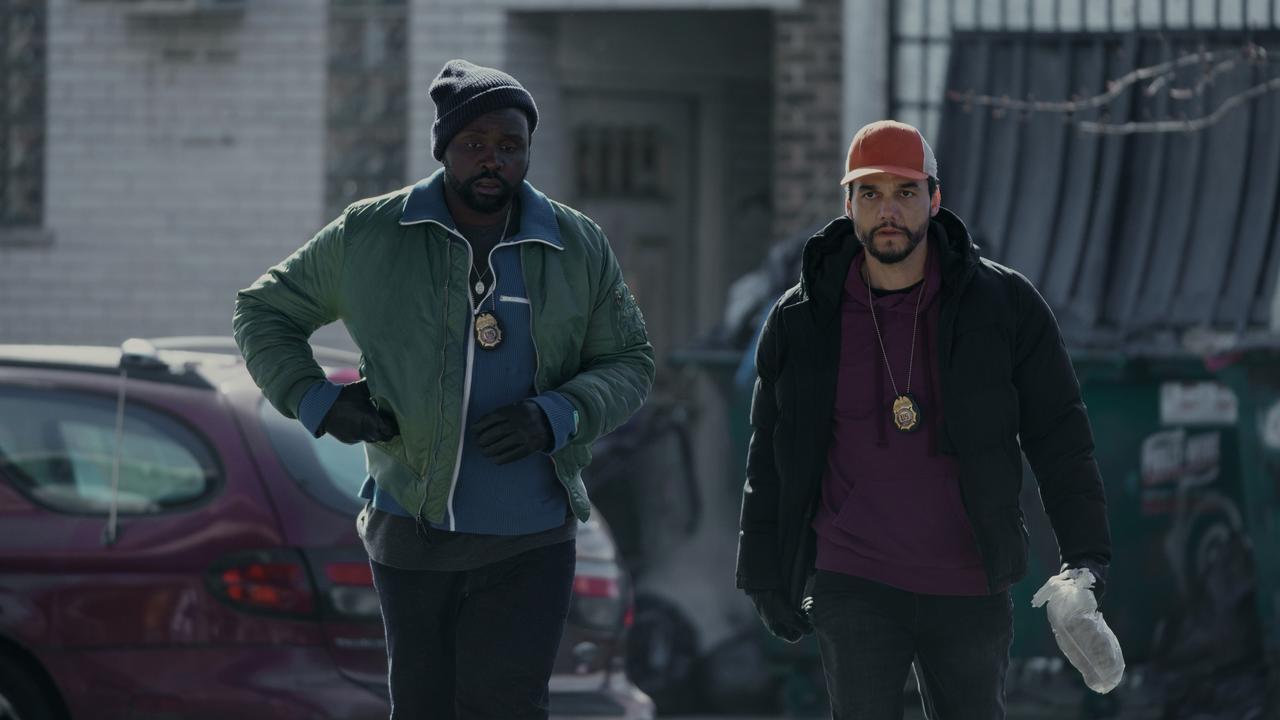Jimmy McGovern’s devil of a Time
Jimmy McGovern’s latest drama, set in a grim British prison, will make you shiver and make you think.

‘Writing is so hard, so why do it if it’s not about something that matters?” the acclaimed British TV dramatist Jimmy McGovern is fond of saying. “There is room for all kinds of drama, but the writers I admire write about things that matter.”
McGovern, of course, among other renowned shows, is the author of crime drama Cracker, which broke new ground by introducing us to the consulting criminal psychologist, and the anthology-style series The Street and Accused, TV shows which subjected his own culture to withering scrutiny. Broken followed, another of the working class dramas that have been his strength, a series of deceptively mundane stories about ordinary lives centred on the figure of a Catholic priest, presiding over an impoverished urban parish in Northern England.
He emerged with singular intent in a period when British TV drama tirelessly reproduced and repackaged a number of carefully worked formulae to satisfy diverse audience tastes, while innovative, individual and, especially, politically engaged work was marginalised. And has held on to a cherished, if sometimes controversial, belief that TV drama should say more about the world we live in today and not rely on “costumes, irony and pastiche”.
His latest is Time, a claustrophobic prison drama that reunites McGovern with Sean Bean for a third time, after the actor’s BAFTA-winning performance as that troubled priest in Broken. And with Stephen Graham, another favourite of the writer, who also starred in McGovern’s Emmy-winning Accused back in 2010.
The director is Lewis Arnold best known for his work on the twisty Broadchurch, which so compellingly explored the terrible ramifications of a single death in a small community and Des, that chilling exploration into the motives of Scottish serial killer Dennis Nilsen.
And under Arnold’s documentary-style direction, intensely realistic, Time is relentless, unnerving and urgent storytelling, TV drama that matters. Like so much of McGovern’s work, the three-part series is set in the north of England, most of the shoot taking place in Liverpool at the height of the coronavirus pandemic, which came with challenges the cast and crew managed to overcome. Given it’s set in grim, bleak penal corridors with many actors crammed into proximity, playing institutionalised inmates constantly bearing down on each other, it must have been a production miracle.
The wings and cells of the show’s HMP Craigmore were filmed at Liverpool’s real-life former prison, HM Prison Shrewsbury, which was decommissioned back in 2013. It’s a grim building dating back to 1793, famous for the huge number of executions by hanging that took place on its grounds, popular with paranormal investigators who visit searching for the lost souls of the unfortunate inmates who were hanged within its walls.
It starts with a man’s voice shouting, “Open this door”. And the percussive sounds of banging and smashing. And a shot appears, somehow creeping down from above several stricken-looking men in a prison van about to deliver a bunch of belligerent prisoners to prison settling on the man violently trying to make his point. It’s an extraordinary opening. The man slams and thumps the metal doors while the camera then drifts and focuses in close-up on a prisoner we come to know is Mark Cobden, played with a kind of clenched intensity by Bean, clearly out of his depth. Arnold allows his camera to contain the actor’s face through this first episode in many intimate close-ups so we lose ourselves in its landscape, exploring every nuance of expression. It’s a revealing device.
At the start, as he’s led to the prison, Mark is completely out of place, a well-educated teacher, a gentle, rather distracted bloke who finds himself in something Dante might have imagined, locked in with men who enjoy torturing and maiming each other. The first scenes provide a kind of surreal, ritualistic introduction to the finality of time in prison, a deafening discordance of heavy steel doors slamming, the clanking of keys, men shouting at the top of their voices, screams, banging of metal bars.
McGovern’s Craigmore is a place of violent intensity, with drug-taking, blackmail, abuse and self-harm, vicious fights over food and phone calls, men doused in boiling water in revenge for some imagined slight, and a sense of tragic inevitability hanging over the mean lives of the inmates.
Mark is introduced to his cellmate, Bernard (Aneurin Barnard), a thin faced boyish figure, intense and paranoid, in for 10 years having murdered his father. Determined from the start, he believes Mark has been sent to spy on him and, suffering a panic attack, he begins slashing his wrists, his body covered in scars, a self-harmer. Blood spurts across Cell 39 but Mark can’t raise help, a warder at the door simply muttering, “They’re busy; there’s a lot of this about.” Riot police arrive, Bernard shouting he has AIDs waving his bloody arms at them but they take him down, Mark shell-shocked. His first day.
Softly spoken and introspective, Mark is deeply haunted by his crime, tormented by visions of the cyclist he killed after a night on the vodka, constantly in the darkness hearing the words of his widow yelling at him: “May you rot in prison and burn in hell, you drunken bastard.” All he feels is the crushing pressure of panic, guilt and fear, knocking the air out of him.
He’s then introduced to prison warden Eric McNally, (“Call me boss”) played by Graham with a steely grimness, stoic but tense with the effort of self-control, the officer in charge of prisoners’ wellbeing.
And quickly a central parallel narrative plotline emerges. His son David is also in prison, something Eric is determined to conceal, but he’s confronted by a prisoner out of ear shot of others. He knows of David’s imprisonment. “You want him to be comfy don’t you?” he says. “We know loads of lads down there.” Mark is shocked. “You make him nice and comfortable, what do I do in return?” The prisoner grins. “We’ll let you know about that.”
As in most of McGovern’s stories this narrative highlights just how easily lives turn on quirks of fate, that the universe has an order and that no matter how hard you try, you can’t get away from it. McGovern is fascinated as a writer by the moral dilemmas that emerge as consequences of mistakes, unwise choices and personal weakness.
The first episode is taut and controlled effortlessly by Arnold, establishing just how close Mark is to breaking point, unable to accept the conditions under which he is forced to live and desperate for atonement. Eric’s situation is equally bleak. There’s no doubt that to preserve the life of his son he will have to allow himself to be controlled by someone in the prison who will make him perform criminal acts on their behalf. Or maybe not. But he is already coiled ready to violently release his sense of futility. Both are men caught by fate with no place to turn.
Like anything McGovern writes it’s based on stuff he knows. When he moved decades ago from teaching to script writing he conducted prison writing workshops and more recently he’s worked with the Sycamore Tree project, a week in-prison program that brings victims of crime into prison to meet with groups of unrelated offenders. There conversations are held about responsibility and reconciliation and the possibility of restitution for harm caused by criminal behaviour.
McGovern says the idea of a prison cell block drama had been in his writer’s mental workshop for nearly four decades, pondering a story about how prisons work, what happens when people are locked away and what leads them to become criminals. And how an almost medieval system brutalises them when they enter such an unforgiving institution.
“From about 1982 onwards, I did a fair bit of work in prisons,” he told BBC News. “I was always popping in there, doing the writer’s workshop. And I was always fascinated by it for all kinds of reasons. But I think the main reason is I always felt ‘there but for the grace of God go I’. Because I was young and skint once, and I did a few naughty things, but I was extremely lucky.”
The main answer to making prisons work better is to empty them, he told journalist Giny Dougary. “If you decriminalised drugs, you’d have empty prisons. And I’d do something about the cells; you shouldn’t eat and shit in the same room. There should also be a lot more meaningful activity, education and training. If only there was a way of altering the minds of the British public when it comes to sentencing. It’s so easy for any political party to say ‘tough on crime’ and get elected. It’s ridiculous.”
Time might just start conversations the writer would welcome as again McGovern makes you realise few TV writers can awaken that shiver of self-recognition as this proud Scouser, the “there’s-a-bit-of-me-in-this” that comes from the most perceptive writing. That, “How would I cope if this happened to me?” Writing that matters.
Time,Sunday, BBC First, 8.30pm, streaming Foxtel On Demand.




To join the conversation, please log in. Don't have an account? Register
Join the conversation, you are commenting as Logout